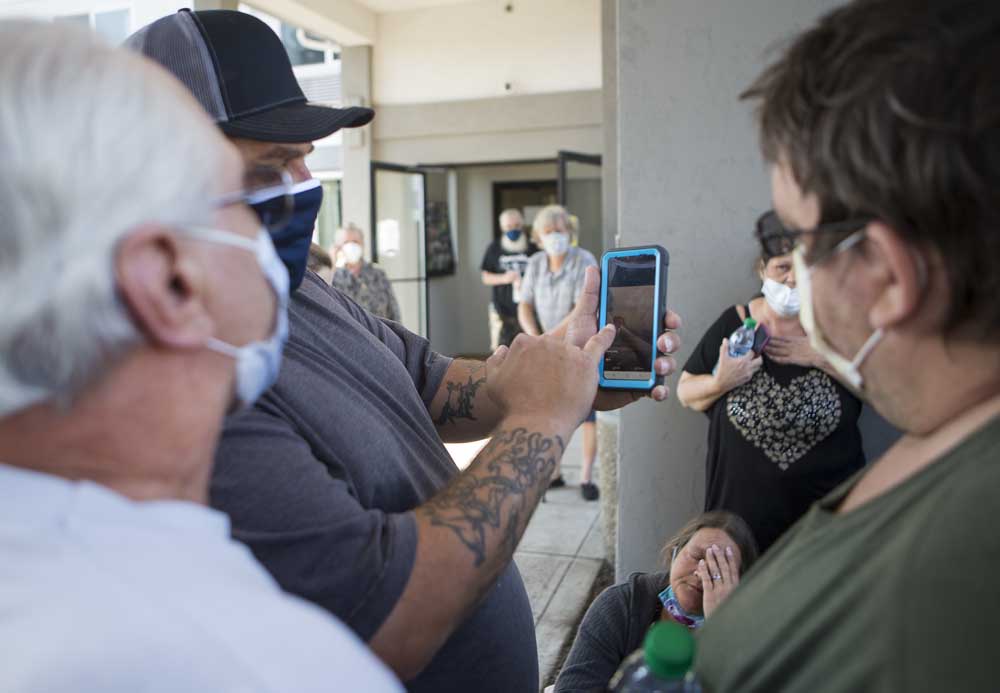As fires destroy towns, displaced residents learn the worst
Published 6:00 pm Wednesday, September 9, 2020

- Ray Mount, a fire refugee from Idanha, uses his phone to show pictures of several burned structures posted on social media by one of his neighbors shortly before attending a briefing on area fires at the Super 8 hotel in Redmond on Wednesday.
REDMOND — In the parking lot of the Super 8 motel, Ray Mount and his family waited Wednesday to hear if their home in Idanha was spared from one of the many wildfires burning 374,522 acres on the western side of Oregon.
Mount, who manages the Mill City Mobil gas station 24 miles from his home, stood with about 60 other people who were also displaced by the wildfires. They all gathered for an update from Kassidy Kern, a spokesperson for the U.S. Forest Service.
“Just keep your fingers crossed, man,” Mount told a friend. “That’s all we can do.”
Kern had no information about Mount’s home, but said entire towns were mostly destroyed, including towns just a few miles from Idanha, such as Detroit, a popular boating and camping town of about 200 residents on Detroit Lake.
“Oh my God,” a displaced resident said, hearing the description. “It’s pretty much gone.”
Detroit and other towns along state Highway 22 were almost completely destroyed by the Beachie Creek Fire, which grew from 500 acres to more than 100,000 acres in just a couple days. At times, the fire grew at a rate of 2.77 acres a second due to high winds in the area, Kern said.
“It grew very, very fast. Very, very quickly,” she said.
Despite its rapid growth, the Beachie Creek Fire may have missed parts of Idanha as it merged with the Lionshead Fire, burning 105,340 acres, Kern said.
Mount tried to keep his family, including his fiancé, son, daughter, aunt and uncle, calm as they still didn’t know the fate of their home in the small town of about 100 people on the Marion County/Linn County line.
“We are just staying optimistic,” Mount said. “If my home is there, thank God. If not, well, then I guess it’s time to rebuild.”
The Red Cross set up Mount’s family and the other displaced families in the Super 8 motel and at the RV park at the Deschutes County fairgrounds.
Nadine McCrindle, executive director of the Central and Eastern Oregon Chapter of the American Red Cross, said the organization has received plenty of donations, such as bottled water and phone chargers. What the Red Cross needs to help families is monetary donations, McCrindle said.
The Red Cross would normally house people at the Deschutes County fairgrounds, but due to the COVID-19 pandemic, the organization is hosting people at the hotel. Financial donations would help fund the hotel stays, McCrindle said.
“We are paying for hotels at the moment, which is a lot more expensive than setting up in a convention center,” she said.
On Wednesday, Kern also updated the nearly 30 people at the RV park. Many were there from towns along the McKenzie River that have been destroyed by the Holiday Farm Fire, which is burning more than 100,000 acres.
Gene Flint, a retired Forest Service worker who has lived 30 years in Blue River, a small town on state Highway 126 along the McKenzie River, came to the fairgrounds to hear Kern’s update.
Flint already knew his home was destroyed. He saw a video from a neighbor that showed the entire Blue River area in shambles.
“Blue River is totally wiped out,” Flint said.
Flint fled to his sister’s home in Tumalo, where he will stay until it is safe to return and assess the damage done to his home. He was able to grab important photos and documents, but he left behind his motorcycle and pickup truck. He also forgot to grab a $50 winning lottery ticket.
“I forgot a few things, and I kind of kick myself,” he said. “But I got the most important stuff.”
To help the families displaced by wildfires, donations can be made to the Red Cross online at www.redcross.org/local/oregon/ways-to-donate.html.
For questions about donations opportunities, call 503-528-5634.






